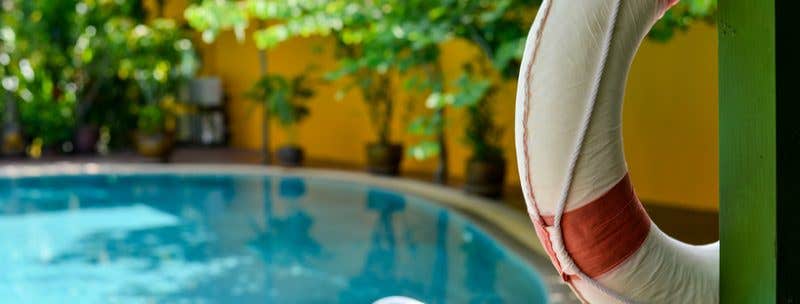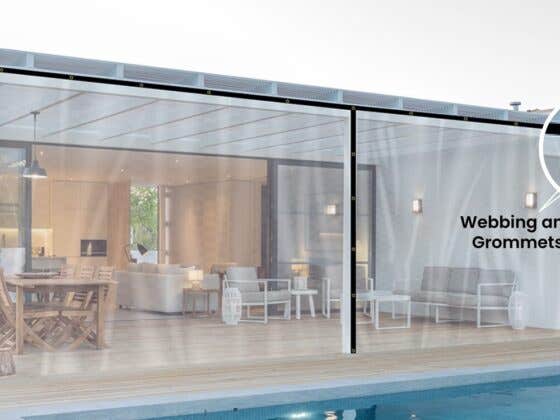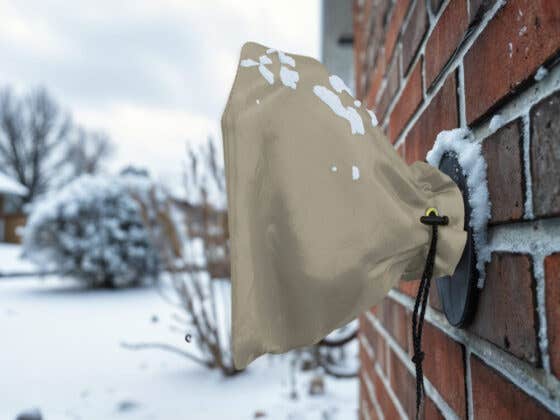Summer, especially sunny afternoons spent poolside, is beloved for a number of reasons. With as much time as you and your family will be spending taking dips in the water, it’s crucial that you have safety implements in place for swimmers of all ages and experience levels. Encouraging pool safety is a summer breeze when you utilize straightforward, easy-to-implement tips all summer long.
Level Up

Before opening your pool to backyard swimmers, take the time to perform a safety check of your pool’s chemical levels. Chemicals are crucial to keeping your pool clean, but too much of any one chemical can cause harm to swimmers.
There’s no need to play guessing games when it comes to determining your pool’s chemical levels. DIY tests kits are widely available to help you determine if there’s too much chlorine present in your pool’s water.
Storage Safety
Every type of pool chemical, from filter cleaner to algaecide and chlorine, must be properly stored when not in use. Unregulated exposure to these types of substances can lead to irritation or even accidental poisoning.
Preventing exposure starts with safe storage. Store pool cleaning chemicals in a locked, temperature controlled area that’s protected from the sun. Remember also to always keep children away when using chemicals for cleaning and maintenance.
Slow Down
No running! This pool safety staple is likely familiar to everyone. Kids may be bursting at the seams for their daily summertime swim, but enforcing this rule is crucial for keeping everyone safe.
Take some inspiration from your local public pool and hang up signage imploring swimmers to slow down around your pool. And don’t worry about sounding repetitive: the more you mention the rule, the better!
Float Along
Perhaps the most important safety measures you need to have on your pool deck are emergency flotation devices. In the unlikely event of an emergency, these devices can help save a life.
Your pool should have flotation rings, life jackets, and water wings. Each of these should be safety certified, easy to access, and ready to use at any time.
Dive Careful

Diving into the shallow end of a pool is the most dangerous decision a swimmer can make. Even experienced divers can face injury or even death if plunging into shallow waters. It is paramount that the depths of your pool are clearly marked from the shallows all the way to the deep end.
Be sure to utilize signage warning against diving in any depths shallower than 2.7 M, and explain to younger and less experienced swimmers the very real dangers of improper diving.
First Aid Ready
Be prepared for cuts, scrapes, and other minor injuries to pop up among your summer swimmers. Having a first aid kit ready to use at a moment’s notice gives you the upper hand on keeping everyone safe and sound.
A well stocked poolside first aid kit should include hydrogen peroxide, bandages, antibiotic ointment, sterile cotton pads, and non-latex gloves. Store the kit in a spot that’s easily accessible away and safe from the elements.
Sun Smart

A crucial aspect of summer swim safety is sun protection. A swim session may cool you down, but don’t let yourself be fooled by the cool: a sunburn can happen even while underwater. And a summer’s worth of sunburns can lead to long-term skin damage.
Waterproof sunscreen is invaluable on poolside afternoons. Apply frequently, especially after toweling down, and be sure to let the sunblock dry fully before diving back into the water.
Stay safe from the sun under the protective shade of canopy covers when not in the water. And don’t forget to keep your poolside accessories safe from the sun as well with protective measures like UV resistant outdoor patio furniture covers or sectional covers.
On Guard
You may not need to hire a professional lifeguard to monitor your pool, but it’s absolutely necessary that an adult with strong swimming abilities is present whenever someone is taking a dip. You’re in even better shape for safety if said guard happens to be first aid certified.
No Phone Zone
When it comes to monitoring swimmers, distractions mean danger. Cut out the number one cause of distractions by putting away your phone while you keep an eye on young swimmers.
Need some entertainment while you guard? Stream your favourite album or a podcast episode through a waterproof bluetooth speaker on low volume during kid swim to keep things lively.
Adult Swim Safety

No matter whose turn it is to lifeguard, breaks are necessary to stay alert. Consider implementing a 15 minute adult swim session every hour to let the adults relax. You can keep the little ones occupied by pulling off the sectional covers and serving them some delicious ice lollies.
Storm Watch

Thunderstorms are synonymous with the summer months, and can prove to be a dangerous threat to afternoon swims. Make a habit of checking the day’s forecast every morning to stay on top of storm patterns. Be aware, however, that a surprise storm can always make an unwelcome appearance.
If you hear thunder or see lightning, evacuate the pool and move everyone away from the water. Encourage your family and guests to head inside while you place the garden furniture covers on to protect your outdoor lifestyle area from the surprise storm.
Restrict Rough Play
Rough housing is one of the most common ways for swimmers to get hurt or, in serious cases, very injured. Whether it’s playing chicken or pushing one another into the water, horsing around is never a smart idea. Enforce a strict “no rough play” rule at your pool for swimmers of all ages.
Secure It

Pool safety should be implemented even when no one is hanging out poolside. An unattended pool presents a number of dangers to small children or pets who are exploring the area unsupervised.
Implementing measures such as pool gates, alarms, or custom tarps to cover the pool cuts down on those risks significantly, leaving you with the peace of mind that your pool remains safe, swimmers or not.

















Recent Comments